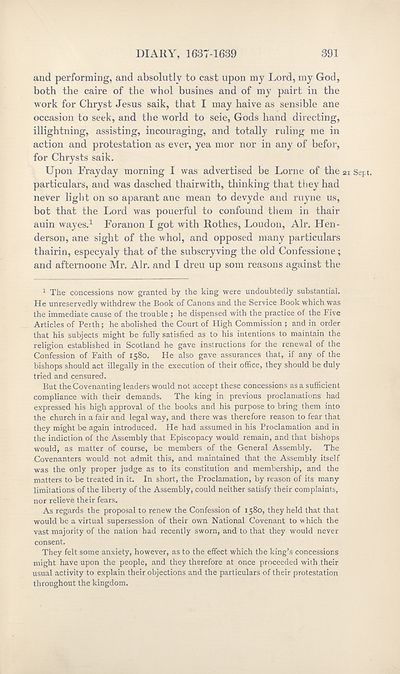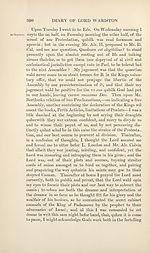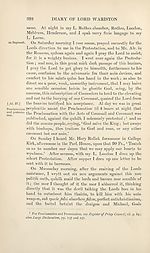Series 1 > Diary of Sir Archibald Johnston of Wariston 1632-1639
(450) Page 391
Download files
Complete book:
Individual page:
Thumbnail gallery: Grid view | List view

DIARY, 1637-1639
391
and performing, and absolutly to cast upon my Lord, my God,
both the caire of the whol busines and of my pairt in the
work for Chryst Jesus saik, that I may haive as sensible ane
occasion to seek, and the world to seie, Gods hand directing,
illightning, assisting, incouraging, and totally ruling me in
action and protestation as ever, yea mor nor in any of befor,
for Chrysts saik.
Upon Frayday morning I was advertised he Lome of the 2i Sept,
particulars, and was dasched thairwith, thinking that they had
never light on so aparant ane mean to devyde and ruyne us,
hot that the Lord was pouerful to confound them in thair
auin wayes.1 Foranon I got with Rothes, Loudon, Air. Hen¬
derson, ane sight of the whol, and opposed many particulars
thairin, especyaly that of the subscryving the old Confessione;
and afternoone Mr. Air. and I dreu up som reasons against the
1 The concessions now granted by the king were undoubtedly substantial.
He unreservedly withdrew the Book of Canons and the Service Book which was
the immediate cause of the trouble ; he dispensed with the practice of the Five
Articles of Perth; he abolished the Court of High Commission ; and in order
that his subjects might be fully satisfied as to his intentions to maintain the
religion established in Scotland he gave instructions for the renewal of the
Confession of Faith of 1580. He also gave assurances that, if any of the
bishops should act illegally in the execution of their office, they should be duly
tried and censured.
But the Covenanting leaders would not accept these concessions as a sufficient
compliance with their demands. The king in previous proclamations had
expressed his high approval of the books and his purpose to bring them into
the church in a fair and legal way, and there was therefore reason to fear that
they might be again introduced. He had assumed in his Proclamation and in
the indiction of the Assembly that Episcopacy would remain, and that bishops
would, as matter of course, be members of the General Assembly. The
Covenanters would not admit this, and maintained that the Assembly itself
was the only proper judge as to its constitution and membership, and the
matters to be treated in it. In short, the Proclamation, by reason of its many
limitations of the liberty of the Assembly, could neither satisfy their complaints,
nor relieve their fears.
As regards the proposal to renew the Confession of 1580, they held that that
would be a virtual supersession of their own National Covenant to which the
vast majority of the nation had recently sworn, and to that they would never
consent.
They felt some anxiety, however, as to the effect which the king’s concessions
might have upon the people, and they therefore at once proceeded with their
usual activity to explain their objections and the particulars of their protestation
throughout the kingdom.
391
and performing, and absolutly to cast upon my Lord, my God,
both the caire of the whol busines and of my pairt in the
work for Chryst Jesus saik, that I may haive as sensible ane
occasion to seek, and the world to seie, Gods hand directing,
illightning, assisting, incouraging, and totally ruling me in
action and protestation as ever, yea mor nor in any of befor,
for Chrysts saik.
Upon Frayday morning I was advertised he Lome of the 2i Sept,
particulars, and was dasched thairwith, thinking that they had
never light on so aparant ane mean to devyde and ruyne us,
hot that the Lord was pouerful to confound them in thair
auin wayes.1 Foranon I got with Rothes, Loudon, Air. Hen¬
derson, ane sight of the whol, and opposed many particulars
thairin, especyaly that of the subscryving the old Confessione;
and afternoone Mr. Air. and I dreu up som reasons against the
1 The concessions now granted by the king were undoubtedly substantial.
He unreservedly withdrew the Book of Canons and the Service Book which was
the immediate cause of the trouble ; he dispensed with the practice of the Five
Articles of Perth; he abolished the Court of High Commission ; and in order
that his subjects might be fully satisfied as to his intentions to maintain the
religion established in Scotland he gave instructions for the renewal of the
Confession of Faith of 1580. He also gave assurances that, if any of the
bishops should act illegally in the execution of their office, they should be duly
tried and censured.
But the Covenanting leaders would not accept these concessions as a sufficient
compliance with their demands. The king in previous proclamations had
expressed his high approval of the books and his purpose to bring them into
the church in a fair and legal way, and there was therefore reason to fear that
they might be again introduced. He had assumed in his Proclamation and in
the indiction of the Assembly that Episcopacy would remain, and that bishops
would, as matter of course, be members of the General Assembly. The
Covenanters would not admit this, and maintained that the Assembly itself
was the only proper judge as to its constitution and membership, and the
matters to be treated in it. In short, the Proclamation, by reason of its many
limitations of the liberty of the Assembly, could neither satisfy their complaints,
nor relieve their fears.
As regards the proposal to renew the Confession of 1580, they held that that
would be a virtual supersession of their own National Covenant to which the
vast majority of the nation had recently sworn, and to that they would never
consent.
They felt some anxiety, however, as to the effect which the king’s concessions
might have upon the people, and they therefore at once proceeded with their
usual activity to explain their objections and the particulars of their protestation
throughout the kingdom.
Set display mode to:
![]() Universal Viewer |
Universal Viewer | ![]() Mirador |
Large image | Transcription
Mirador |
Large image | Transcription
Images and transcriptions on this page, including medium image downloads, may be used under the Creative Commons Attribution 4.0 International Licence unless otherwise stated. ![]()
| Scottish History Society volumes > Series 1 > Diary of Sir Archibald Johnston of Wariston 1632-1639 > (450) Page 391 |
|---|
| Permanent URL | https://digital.nls.uk/127536229 |
|---|
| Attribution and copyright: |
|
|---|
| Description | Over 180 volumes, published by the Scottish History Society, containing original sources on Scotland's history and people. With a wide range of subjects, the books collectively cover all periods from the 12th to 20th centuries, and reflect changing trends in Scottish history. Sources are accompanied by scholarly interpretation, references and bibliographies. Volumes are usually published annually, and more digitised volumes will be added as they become available. |
|---|


